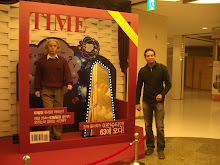 At no other time in the history of the world has there been such a need for intercultural education. As globalization and technology bring people closer together day-by-day, cross-cultural awareness is becoming essential to peaceful human co-existence. Recognizing the importance of mutual understanding among different people, CCAP, organized by the Korean National Commission for UNESCO and supported by the Ministry of Education & Human Resources Development, has been introducing a diversity of cultures from around the world to Korean youth since 1998. CCAP is designed to be a participatory process that augments education for international understanding in schools nationwide and promotes a culture of tolerance and mutual respect.
At no other time in the history of the world has there been such a need for intercultural education. As globalization and technology bring people closer together day-by-day, cross-cultural awareness is becoming essential to peaceful human co-existence. Recognizing the importance of mutual understanding among different people, CCAP, organized by the Korean National Commission for UNESCO and supported by the Ministry of Education & Human Resources Development, has been introducing a diversity of cultures from around the world to Korean youth since 1998. CCAP is designed to be a participatory process that augments education for international understanding in schools nationwide and promotes a culture of tolerance and mutual respect. CCAP Regular Class is the central activity of the CCAP. In this program, foreign residents in Korea are invited to share their culture with Korean youths. Normally assisted by Korean Interpretation Volunteers (KIVs), foreigners act as Cultural Exchange Volunteers (CEVs) to provide an animated lecture about their home country for an hour or two at the school. While some deliver three or more lectures a month, once or twice is the norm. Depending on the children’s age and in interests, volunteers may elect to teach a folk song or dance, cook a traditional dish, or even introduce their own family through snapshots. Volunteers avail themselves of such props as videotapes, flags and traditional games and clothes that KNCY stores in the CCAP Resource Room at its Myeong-dong office. Anyone, regardless of age, sex, religion or country of origin, can participate in the program as a volunteer. By involving themselves in this unique and exciting endeavor, all participants are able to deepen their understanding of each other and broaden their commitment to a culture of tolerance and mutual respect.
In addition to the regular CCAP classes, CCAP Caravan teams are sent to schools in remote areas where students have little or no exposure to diverse foreign cultures. Consisting of six to eight CEVs and KIVs each, the caravan teams take weekend trips and offer class environment interactions in which foreign volunteers present their culture to students. The teams also have student Q & A sessions and a one-night stopover with Korean families allowing both sides to further share cultural experiences. This program not only benefits all students of the chosen schools, but also provides foreign volunteers with a chance to experience rural Korean culture, go sight seeing off the beaten track, and make friends with fellow volunteers.
If you love to teach and want to share your culture with Korean kids, then, why not to click here http://ccap.unesco.or.kr and go to the next class. May be, we can see each other there……...





1 comment:
Hey Jamali! I was a cultural exchange volunteer in this program back in 2002, in Tongyeong city! It was an amazing experience which made me fall in love with Korea and come back! I totally recommend it! Every living or visiting foreigner in Korea should try and do it once ;) cheers
Post a Comment